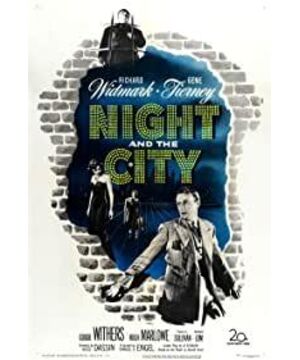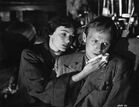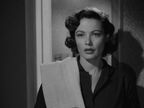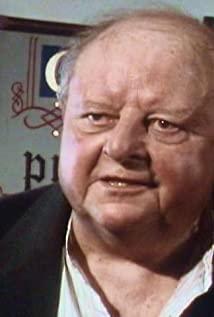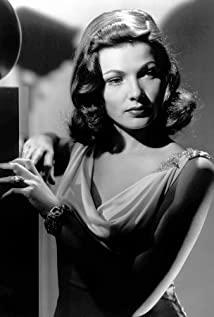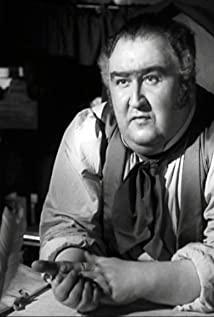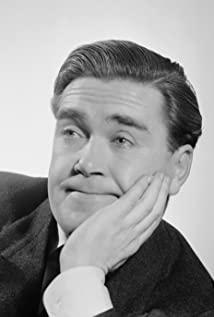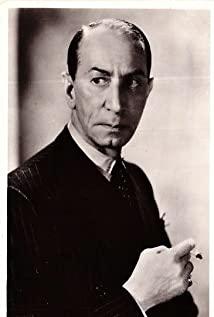But there is another kind of noir film. Its protagonists are unstable factors, and they are the destroyers of social balance. These protagonists are generally criminals in gangster films or gangster films, such as "Little Caesar" and "National Enemy". Of course, the final result of their shaking the balance is their own destruction, and society restores balance.
As a film noir, "The True Colors of the Sea" is closer to the latter, but its protagonist, Harry, is not a criminal, and he has not been able to change the balance of society, even temporarily. He is just on the edge of society. He "want to be somebody", but everyone knows that his career will not succeed. His girlfriend Mary loves him but does not believe him. He goes to find someone to borrow money, the same No one believed his promise of "life of ease and plenty", so when he asked the bar owner Phil to invest in his wrestling agency business, Phil laughed so happily as if he heard a huge joke, and he changed To be so desperate and hysterical. Whether in the Baidao or the underworld, he is just a small person who struggles hard on the edge. He desperately wants to deal with people and forces that are much stronger than him, and wants his own success, just like a wandering between elephants. Like the mouse, he was eventually swallowed by risk rather than success.
In the first mode of film noir, the femme fatale bears the objective reason for the protagonist to memorize to some extent (the so-called “other”). The protagonist is not incapable, positionless, and mindless, but the femme fatale is too temptation to make herself betray. The superego, "it's not that our army is incompetent, but that the Gong army is too cunning." But Harry in this film is not tempted by femme fatales, and the motives for what he does are completely borne by himself, so he is still different from many other male protagonists in noir films. He is neither moral nor decent, let alone unethical. Success; there is no external reason to justify his depravity. So it's no wonder that when film noir was in power, the New York Times gave it such a low evaluation (the adjectives for it are basically weird, indecent, trash, immoral, and indecent).
Helen is a character closer to the "femme beauty" in the film noir. Like other "femme beauty", she is with a man she doesn't love. She is eager to leave him. She hopes to use the power of another man. And seduce him. It's a pity that the desire to be forced to wait dazzled her to seduce the wrong person. Harry is not a man with a stable and decent social status, he is too boyish, "like a kid playing in a man's world", how can he save Helen? In fact, Helen and Harry are more like equal instability factors. They are not part of the social balance, but their disturbances lead to different goals. In comparison, Helen's original social status was more stable than Harry's, so in their relationship, Harry deceived Helen and caused her to fall into a situation where it was impossible to recover.
In the 1992 remake of De Niro's "The True Colors of the Seas", the script removed the role of Gene Tierney (Mary), because this role was the job of the boss of Fox at the time to make Tierney, who was in love and suicidal, a distraction. And it was arranged temporarily. But the 92 version of the movie also changed the end of the story. After Harry was hunted down and shot, he was rescued by an ambulance. He woke up in Helen's arms, and the two people got the chance to start again, so It is said that this movie was translated into "Atonement for Merit".
I don't know what the 1950 version of the movie script will be like before joining Mary, but it will still be a desperate movie. The whole movie always hinted at Harry's fate. He has been teasing and stimulating the wrestler The Strangler. The Stragler is stupid and mindless, but he is an uncontrolled beast. Harry thinks he can manipulate him, but the movie keeps telling the audience how dangerous his behavior is. He was picked up by The Strangler like a chicken, punched with an old fist, and finally strangled to death by the Strangler. In terms of performance and details, Harry's fate was also destined. What’s impressive is that when Harry asked Phil for £200 to sign a contract, he happily told Phil that he had successfully won The Strangler. He was talking excitedly on drums and gongs, but in return Phil's accusation and curse against him, in the end Phil also knocked the gong as if sentenced, like it sounded Harry's death knell.
When the film was released, the UK and the US released different edited versions. One is that the music is different. The British version of the soundtrack is not as dramatic and romantic as the American version, but is light and casual in a skit, a bit like "The Third Man." The soundtrack feel. After all, Europe is more sophisticated than the United States, and can often be more indifferent or even joking about the joys and sorrows of the world. However, the American version is closer to the director Dassin's intentions (although he was blacklisted because of McCarthyism at that time and could not directly participate in any editing). The combination of the passionate music of the American version and the strong and desperate black in the film complements each other better. At the end of the American version, Harry is thrown into the Thames, the gang boss Kristo throws his cigarette butt into the river with no expression, and it ends when he turns and leaves. Whole film. In fact, from a certain angle, the ending of the American version is more romantic than the British version, because the romance of darkness and despair is also romantic. Who can say that the gloomy romanticism of Novalis and Hawthorne is not romantic? At the end of the British version, Mary and Adam walked into the morning light on the bridge together. They had a taste of "always giving people away and returning home to each other". Who in the world can't live without it, not to mention Mary. She would only live better without Harry.
However, the director Dassin does not approve the ending of the British version. This ending implies that Mary and Adam will get their happiness. The black light and shadow that the director has carefully set up are also integrated into the morning light, which is not in line with the state of the movie. As mentioned in the movie trailer and a CC version of the DVD review, everyone in the movie has their own ideas, but no one gets what he wants. The wrong relationship connects the wrong people, and some people Some people are alive, but no one is a winner. Although the dawn has arrived, people's hearts are still dark.
View more about Night and the City reviews


